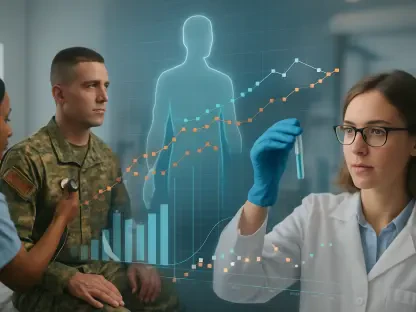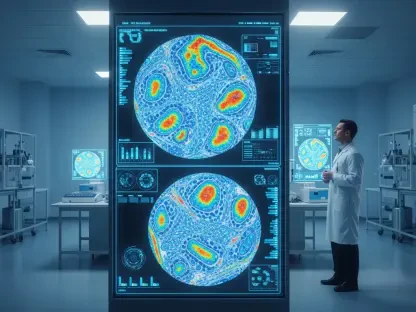The landscape of drug discovery, particularly for complex neurodegenerative diseases like ALS (Amyotrophic Lateral Sclerosis), is undergoing rapid transformation with the advent of artificial intelligence. Louisiana is making significant strides in this arena with the inception of the Louisiana AI Drug Development Infrastructure for ALS (LADDIA), a pioneering initiative designed to enhance ALS drug discovery processes. Supported by collaborations among prestigious institutions like GATC Health, Pennington Biomedical Research Center, and Tulane University, LADDIA demonstrates the potential of AI in overcoming existing challenges in developing effective ALS treatments.
Overview of the ALS Drug Discovery Landscape
Currently, the ALS drug discovery landscape is marked by a blend of urgency and promise, as treatments for this debilitating condition remain elusive. The disease’s complexity necessitates innovative approaches, prompting increased reliance on advanced technologies. AI, in particular, is reshaping methodologies to improve the precision and efficiency of drug development. Collaborative efforts among key players, including healthcare and tech firms, bolster this shift. These alliances drive progress through shared resources and expertise, while compliance with critical regulations ensures the ethical use of data and technology.
Major Technological Influences
Innovative technological advancements are pivotal to transforming ALS drug discovery. AI-powered platforms offer significant improvements by facilitating more accurate target identification and enhanced predictive analytics. This leads to quicker, more efficient processes in understanding and tackling neurodegenerative diseases. The integration of big data and predictive analytics allows scientists to glean invaluable insights from vast datasets. Consequently, these technologies represent a game-changing approach to navigating the complexities of ALS.
Key Market Players and Collaborative Initiatives
Strategic partnerships among experienced institutions and companies power progress within the ALS drug discovery sphere. Initiatives like LADDIA harmonize efforts across sectors, effectively pooling knowledge and resources. This collaborative model not only accelerates drug discovery but also fosters an environment of innovation and creativity. By leveraging world-class data and AI platforms, stakeholders aim to pave a path toward groundbreaking ALS treatment development.
Emerging Trends in AI-Driven Drug Discovery
The field of AI-driven drug discovery evolves rapidly, introducing exciting new trends and prospects. As AI technology develops, it transforms traditional processes, rendering them more adaptable to the demands of modern medicine.
Technological Advances and Innovative Platforms
Advancements in AI continue to revamp how drugs are developed by delivering unparalleled precision and speed. Novel AI platforms can predict outcomes and model biological processes with increasing accuracy, saving time and resources. At the core of these transformations are robust predictive models developed from rich, comprehensive datasets. Such data integration fosters deep learning and invaluable insights into ALS and other neurodegenerative diseases, marking a paradigm shift in medical research.
Market Growth Insights and Future Projections
Current market analysis indicates promising growth in AI-driven drug discovery, signaling exciting opportunities for investment. This sector is poised for accelerated expansion as AI continues to deepen its involvement in biomedical research. Industry projections reveal favorable trajectories, as rising acceptance of AI technologies underscores their potential to revolutionize drug discovery processes. Such growth fosters a dynamic investment landscape, ripe with possibilities for stakeholders eager to capitalize on this burgeoning field.
Challenges and Solutions in AI-Enabled ALS Research
While AI adoption in ALS research holds considerable promise, it also faces distinct challenges. Technological barriers demand innovative solutions to ensure effective deployment and utilization of AI systems.
Technological Barriers and Data Privacy Concerns
Key obstacles include technical limitations and concerns over data privacy, which can impede progress if not addressed. Ensuring data security and integrity is crucial, particularly when handling extensive and sensitive datasets. Overcoming these barriers requires implementing cutting-edge technologies and infrastructural improvements, fortified by vigilant data protection protocols.
Regulatory Challenges and Compliance Strategies
In navigating regulatory landscapes, compliance with established laws is essential to maintaining ethical standards and fostering trust. Stakeholders must stay informed about prevailing regulations, crafting strategic approaches to ensure adherence. In doing so, the AI-driven ALS research community can advance responsibly while navigating potential legal complexities.
Regulatory Impacts on AI-Driven Drug Discovery
The influence of regulation on AI-enabled drug discovery practices is profound, dictating the parameters within which innovation occurs. Crucial laws and standards govern the ethical deployment of AI technologies, demanding vigilant compliance and security measures. By understanding regulatory impacts, industry participants can align their practices with mandated requirements, ensuring AI is applied safely and effectively.
Future Directions and Innovations in AI-Driven ALS Drug Discovery
The future of AI in ALS drug discovery is marked by exciting developments and innovations that promise to reshape the industry. Anticipated technologies and market disruptors will push the frontiers of what’s possible, while consumer expectations evolve to prioritize patient-centered solutions. Such shifts create promising growth opportunities, encouraging further exploration within the sector. Innovations in personalized treatment and AI integration exemplify the potential for continued progress, crafting a landscape that values patient outcomes and technological advancements equally.
Conclusions and Strategic Recommendations
AI presents transformative potential in the realm of ALS drug discovery, driving significant changes to existing research methodologies. The landscape is shaped by accelerated growth, making it conducive to investment and development opportunities. To capitalize on this revolutionary shift, stakeholders must prioritize strategic collaborations, data integration, and regulatory compliance. By embracing these focal points, investors and industry participants can spearhead groundbreaking innovations, delivering lasting solutions to those afflicted by ALS.









